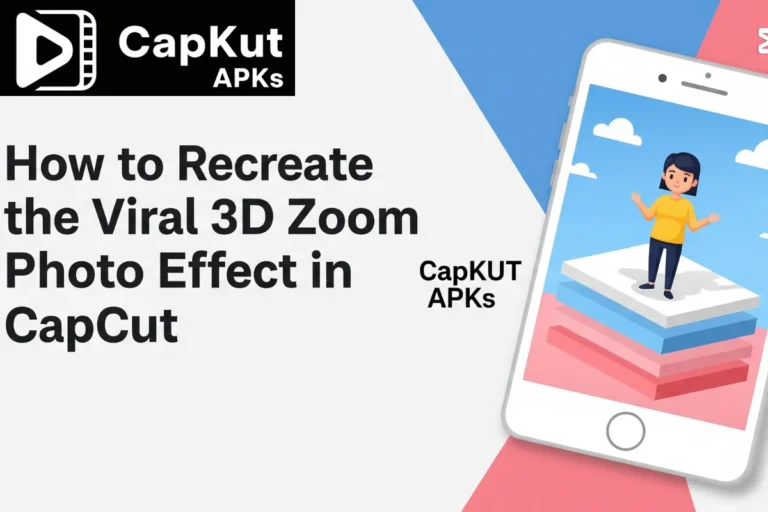
CapCut Green Screen Tutorial: How to Use Chroma Key Like a Pro
Ever wanted to place yourself on a different planet, report from a busy newsroom, or stand next to a dinosaur in your videos?
With CapCut’s Chroma Key tool, you can do just that. This function, known as the ‘green screen’ effect, removes a specific color from your video. This action makes the background transparent. It allows you to place any other image or video behind your subject, creating new scenes.
I am Muhammad Ajmal. The Chroma Key tool is essential for storytelling. It lets me create scenes that would be impossible to film in real life. In this guide, I will show you the exact steps to get a clean, professional-looking result every time. You can also find other guides on CapKutApks.
What You Need Before You Start
You need two separate clips for this effect.
The Background Layer
This is the video or image that will replace your green screen. It can be a city skyline, an animated graphic, or any other scene.
The Green Screen Layer
This video contains your subject. You must film the subject in front of a solid green or blue background. Good, even lighting on this screen is the most important factor. An evenly lit screen is necessary for a clean effect.
Great visuals need great sound. Perfect your project by following our complete audio editing guide.
A Guide to Using Chroma Key in CapCut Premium MOD APK
Step 1: Set Your Background
Open a new project in CapCut 2025. You must first import your background clip. This image or video will sit on the main track of your timeline.
Step 2: Add the Green Screen Clip
Tap the “Overlay” option from the editing menu. The green screen video you want to use can be found in your gallery. This places it on a separate track above your background clip.
Step 3: Locate the Chroma Key Tool
Your timeline should now show the green screen clip. Simply tap it. Swipe through the bottom menu of tools. Find and select “Chroma Key”.
Step 4: Remove the Green Color
A color picker appears on the preview screen. Drag the picker over the green area of your video. Let go. The green background will become transparent, showing the background layer from Step 1.
How to Refine Your Green Screen Effect
Your first result might need adjustments for a clean look.
Adjusting ‘Intensity’
After picking the color, use the “Intensity” slider. Slowly drag it to the right. This removes leftover green pixels from your subject’s edges. Do not drag it too far. This action can make your subject transparent.
Adjusting ‘Shadow’
If the result looks flat, find the “Shadow” slider. A small adjustment here can add back natural dark areas to your subject. This makes the combined video look more believable.
3 Creative Ideas for Your Green Screen Projects
Idea 1: The Virtual Set
Build a professional scene without a physical set. Place your subject in a virtual news studio or a podcast room. You can also create a presentation with the subject standing before a weather map.
Idea 2: “Clone” Yourself
Create the illusion of two of you on screen. You should film yourself on the left side of the green screen. Then, film a second take on the right side. Overlay the two clips to make it appear as if you are talking to a clone.
Idea 3: Magical Effects
Put special effects behind your subject. Film a person reacting to something. Then, replace the green background with a video of magical sparks, a fiery explosion, or a portal effect.
Troubleshooting Common Issues
Problem 1
A green halo or glow around the subject.
Solution
This is known as color spill, which is caused by light refracting off the green screen and bouncing back onto your subject. When filming, move your subject farther away from the screen. In the editor, use the ‘Intensity’ slider to reduce the green glow.
Problem 2
The background is patchy and not fully removed
Solution
This issue usually comes from shadows or uneven lighting on your green screen. The tool removes one specific shade of color. The best way to fix this is to film again with better, more even lighting on the screen itself.
After removing the background, the next step is to create custom animations to make your subject move within the new scene.
Conclusion
The Chroma Key function is a basic tool for any video creator in CapCut Mod APK. It provides complete control over your visual story. You get to build the world your subject appears in.
Now it is your turn to try. Film your own green screen clips with CapCut APK Premium. Test different backgrounds to see what works. Experiment with your lighting combinations to improve your results.
People Also Ask
Do I have to use a green screen?
No. Blue is another common color. The main requirement is a solid, bright color that is not present in your subject’s clothing or features. The tool removes whichever color you select.
Why are parts of my subject becoming see-through?
This typically happens if the ‘Intensity’ slider is set too high. It can also occur if your subject is wearing a color that is too close to the background color. Try lowering the intensity or checking the subject’s clothing.
What can I use if I do not have a professional screen?
Any flat, solid-colored surface can work. People often use a brightly painted wall, a large piece of poster board, or a smooth blanket pulled tight. The key is to light the surface evenly without creating shadows.






